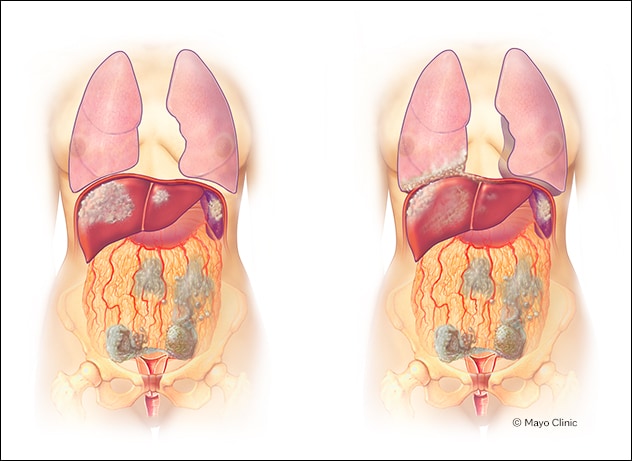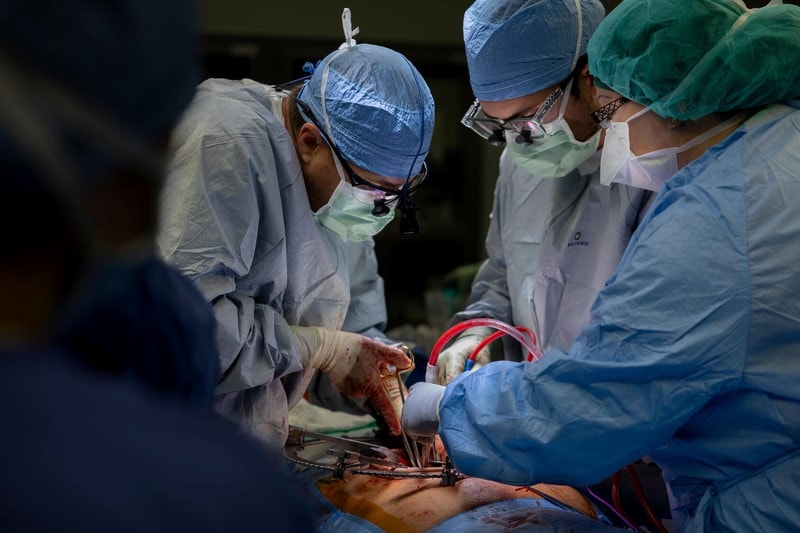July 27, 2024
Mayo Clinic investigators found a distinct ovarian cancer (OC) microbiome, which could support future work seeking early-stage OC detection and treatment response prediction. Study investigators say the OC microbiome findings, published in Scientific Reports, may be useful in working toward identifying this disease at an early, more treatable stage and in anticipating how patients will fare in treatment.
Study details
In this study, the investigators compared findings from a cohort of patients with OC to a cohort of patients without OC. They found that alterations in the relative abundance of certain microbes caused significant differences between the two cohorts. This is notable, according to Marina R. Walther-Antonio, Ph.D., as findings published in a 2020 issue of Trends in Cancer indicate that microbiome alterations can be behind genetic dysregulation and tumorigenesis.
Dr. Walther-Antonio is a microbiome OB-GYN scientist at Mayo Clinic in Rochester, Minnesota. Her research focuses on the human microbiome's role in women's health, especially in gynecologic cancers.
In the study published in Scientific Reports, the investigators share that they discovered that the differences between OC and non-OC are more pronounced in early-stage and lower grade OC.
Further, the investigators identified a microbiome signature in patients with OC who went on to experience poor treatment outcomes. The microbiome signature for these patients was distinct from that of patients who experienced better treatment outcomes, making it a useful treatment response predictor.
"Ovarian cancer is a silent cancer. We don't see early ovarian cancer often when the microbiome markers are stronger. It's difficult to diagnose early. By the time patients experience symptoms, it's often advanced."
Importance of these findings
 晚期卵巢癌
晚期卵巢癌
显示 3 期和 4 期卵巢癌的女性躯干。
 卵巢癌症状
卵巢癌症状
患者出现腹胀、压迫感或饱腹感等非特异性腹部症状。
These findings provide insights for a cancer known for nonspecific symptoms and challenging detection until the malignancy has advanced, says Dr. Walther-Antonio.
"Ovarian cancer is a silent cancer," she says. "We don't see early ovarian cancer often when the microbiome markers are stronger. It's difficult to diagnose early. By the time patients experience symptoms, it's often advanced."
Dr. Walther-Antonio says that OC is often diagnosed at the time of surgery. In addition, she says there is no clear profile for a patient with OC, with no obvious risk factors beyond family history and BRCA gene mutations. When symptoms arise late in disease development, they are vague: bloating, constipation, pressure and a sensation of fullness.
"I don't know of any women who don't experience these symptoms at some point," Dr. Walther-Antonio says. "And, by the time the symptoms are unbearable, they can indicate ascites and more advanced cancer."
Dr. Walther-Antonio says the nonspecific nature of ovarian cancer's symptoms can complicate the process for patients to get to the appropriate expert in the appropriate medical field. Patients eventually diagnosed with OC often end up being evaluated for gastrointestinal disease such as irritable bowel syndrome — which can delay the diagnosis of a gynecologic cancer.
Dr. Walther-Antonio views the findings published in Scientific Reports as most promising currently for patient treatment response prediction, which in the future may provide crucial information in the pursuit of the most effective treatment course.
She acknowledges that while the distinct OC microbiome may be useful for such predictions, she and fellow investigators do not yet know why. Dr. Walther-Antonio also says a key question requiring data to answer is whether the distinct microbiome can be tweaked to convert a poor treatment response into a better treatment response.
A sobering disease to study
Dr. Walther-Antonio began her gynecologic laboratory research looking into endometrial cancer (EC), observing disease microbiome markers to determine which individuals had endometrial cancer and which did not. A colleague encouraged her to apply this research to OC.
 卵巢癌手术
卵巢癌手术
妙佑医疗国际外科团队为一例卵巢癌患者进行手术。
As Dr. Walther-Antonio expanded her research focus into OC, she says she was mentally unprepared for the realities of this cancer in patients' lives compared with the majority of her previous observations of patients with EC. In the first OC surgery she observed, Dr. Walther-Antonio sensed more tension and somberness in the OR than with most EC surgeries she'd seen, due to the advanced stage of the ovarian cancer.
When conducting a four-year follow-up in a study of patients with OC to assess their status, the study coordinator approached Dr. Walther-Antonio inquiring if she was certain she wanted to pursue this avenue.
"The reason the study coordinator said that to me is that most of the patients in the study were deceased," says Dr. Walther-Antonio. "It was sobering for me. These were women in their 50s and 60s. Ovarian cancer is devastating."
Dr. Walther-Antonio says she has noted that everybody struggles in the field of ovarian cancer, facing the sobering reality of the disease.
However, Dr. Walther-Antonio says broad OC screening has been difficult for those in the field to justify, as this cancer is rarer than other malignancies for which the population is broadly screened, such as breast cancer. According to the National Cancer Institute Cancer Stat Facts, there are approximately 20,000 new ovarian cancer cases annually in the U.S.; this cancer also is responsible for 13,000 deaths per year. In contrast, there are approximately 311,000 new breast cancer cases per year in the U.S. Dr. Walther-Antonio also notes that broad screening for a given disease is complex: It is not only costly financially but also costly in potential stress and anxiety for the population screened.
Another new factor for Dr. Walther-Antonio was her discovery that OC laboratory findings were not as translatable as EC laboratory findings.
"While advanced endometrial cancer can be just as deadly as advanced ovarian cancer, endometrial cancer often is caught earlier," she says. "Treatment outcomes are much better for both cancers when diagnosed earlier. For advanced ovarian cancer, there aren't many effective treatments yet."
Disclaimer
Dr. Walther-Antonio and Mayo Clinic have a financial interest in the technology discussed in this article.
For more information
Asangba AE, et al. Diagnostic and prognostic potential of the microbiome in ovarian cancer treatment response. Scientific Reports. 2023;13:730.
Barrett M, et al. Mutagenesis by microbe: The role of the microbiota in shaping the cancer genome. Trends in Cancer. 2020;6:277.
Cancer Stat Facts. Surveillance, Epidemiology, and End Results Program. National Cancer Institute.
Refer a patient to Mayo Clinic.